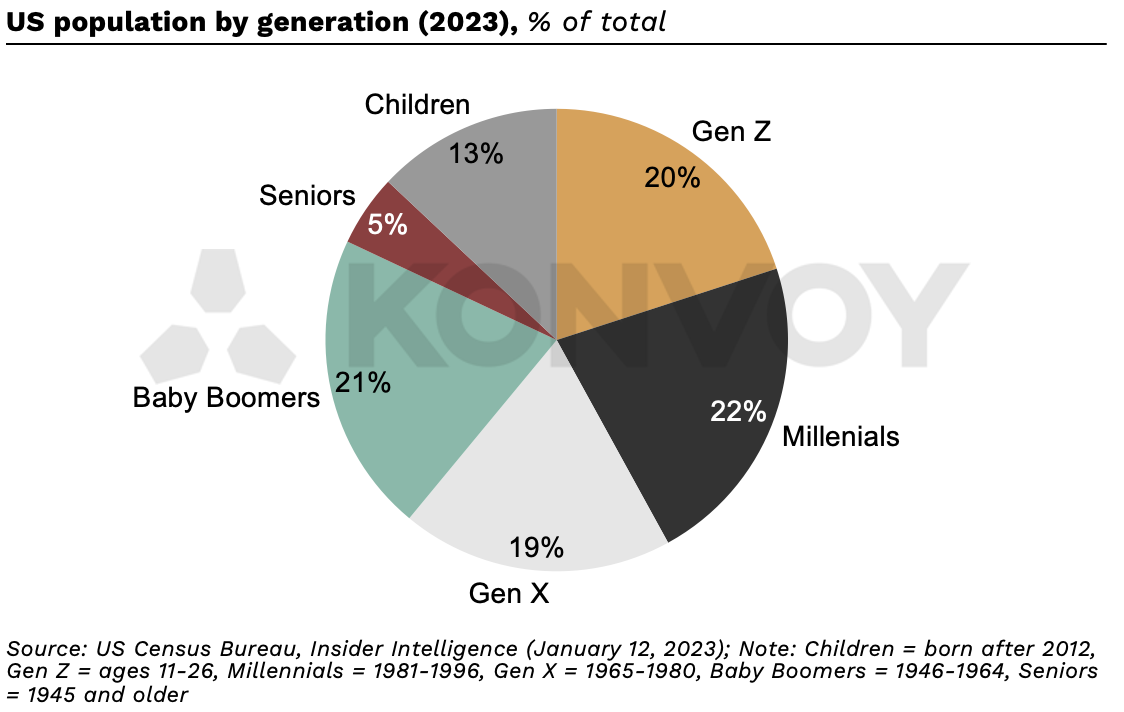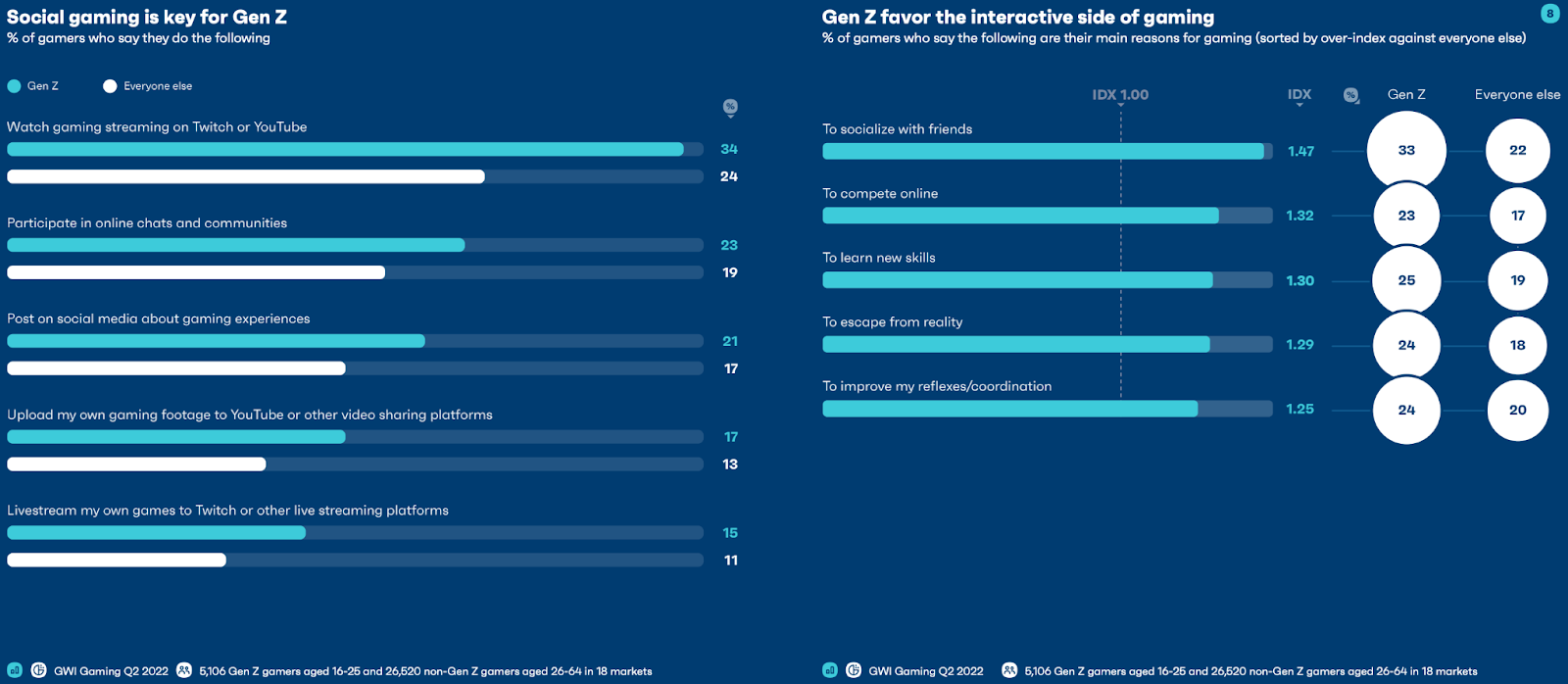Gen Z is shaping the future of consumer technology
Gen Z’s consumption behaviors are going to dramatically impact the future of innovation. To clarify, Gen Z includes people born between 1996-2012. This year in 2023, more than half of Gen Z will be over 18 years old (a requirement for some consumer apps) which paints a better picture with respect to how consumer brands will be shaped. This week, we will be doing a deep dive into how Gen Z interacts with brands, each other, and predict how this will impact the future of gaming.
Gen Z trends
Overview: There are ~68.6m Gen Zs in the United States which is 20% of the US overall population. The median US-based Gen Z salary in 2023 is $33,800 per year and US Gen Zs as a whole have over $360b in disposable income (as of 2021). For context, this is 2.4% of the total US disposable income ($15.13 trillion) from that same year. This generation is also on track to be the most educated generation to date - in 2018, 57% of 18 to 21-year olds were enrolled in college or university, compared with 52% of Millennials, and 43% of Gen Xers at similar ages (Pew Charitable Trusts Living Facts).

When looking at consumption and creation trends for this generation, three things will impact gaming:
1) This generation wants an integrated social experience: As we called out in a previous newsletter, ~95% of teenagers between ages 13–17 use social media, with more than a third saying they use social media “almost constantly” (HHS). The top reason that Gen Z says they play games is to socialize with friends. Also, this generation reports higher rates of watching, posting, and participating on social platforms than any other age group.

While introducing social features to games is certainly not a new concept, we believe that this insight should have higher prioritization for all consumer apps utilizing game-like features (more on this later).
2) Discovery and product research are moving away from traditional search engines and toward social media: Based on a survey by GWI, the top three ways that Gen Zs discover new products is through 1) ads on social media (28%), 2) search engines (27%), and 3) ads seen on TV / streaming services (27%). This is different from millennials who say that the top three ways they discover new products are search engines (30%), followed by ads seen on TV (29%), then ads seen on social media (28%).
This shift toward social media is also present in product research, traditionally the next step after users discover (or become aware of) new products. In 2022, social platforms overtook search engines as the primary product research channel for Gen Z.

When taking a closer look at which ‘social x entertainment’ platforms Gen Z is spending the most time on, YouTube has continued to dominate, with 95% of US teens (which excludes Gen Zs aged 20+) saying they use the platform. The next closest platform is Tik Tok at 67% (Pew Research). When comparing YouTube consumption from generation to generation, Gen Z far outpaces that of older generations (not surprising).
While older generations rely on word-of-mouth from friends or family members (30% for Gen X and 35% for Baby Boomers), for younger generations, this trust in peers has continuously shifted online and toward people that an individual does not have a direct relationship with (GWI).
Given the adoption of YouTube and Tik Tok for Gen Z, and the pressure that regulatory bodies have put on the collection of consumer data, there is an argument that if a consumer app is targeting Gen Z users, it is a more efficient use of dollars to work directly with the ad platforms on YouTube (Google Ad Manager) and Tik Tok (Tik Tok Ads Manager) instead of going through an ad network.
3) Gen Z is the generation that will bring the next evolution of the creator economy: More Gen Zs create digital content than both Millennials and Gen X, and they spend more time doing so per week. This generation is also comfortable automating the easy stuff with 61% of Gen Z adults using ChatGPT today (ZDNET). These two trends are teeing up this generation to have massive buy-in to the platforms that enable them to create and to make money for doing so. We believe that this will revolutionize what the Future of Work looks like for this generation - more on this in the next section.

How these Gen Z trends impact specific industries
At Konvoy, we are interested in investing at the intersection of gaming and other consumer technologies, including Finance, Education, and Health and Wellness. We believe the trends highlighted above and other industry-specific trends will spawn the rise of new consumer applications which will replace their old counterparts that appealed to Millenials and Gen X.
- Finance: 38% of Gen Zs have entered the workforce so far and they will surpass Gen X in its number of US spenders by 2025 (Insider Intelligence). In addition to rapidly increasing spending power, Gen Z has higher expectations of what financial institutions should do for them. In a survey conducted by GWI, 73% say that banks should provide support for customers’ financial wellbeing. The expected supporting features include how to budget, guidance on spending habits, and ways to save for retirement and financial security. Today, only 55% say their bank provides this kind of support.
- Education and the Future of Work: As we noted in our newsletter about postsecondary education, there is an ongoing trend of declining enrollment rates due to lack of faith in the return on investment and decreasing support for access to higher education. As such, we anticipate a rise of alternative education options and less linear career progressions. Today, 41% of Gen Zs said they tend to not trust colleges and universities compared to 49% of Millennials and 53% of Gen Xs. In response, Gen Zs have already begun exploring “side hustles” and other creative entrepreneurship paths.
As we mentioned earlier in this note, 95% of US teens use YouTube. This generation has grown up consuming UGC which showed at a young age that there are other “non-traditional” ways to make money outside of just a 9-5 career. Social media platforms and other types of resources like Udemy and Coursera have democratized access to training and education across a broad range of skills. Fiverr found that 67% of Gen Zs currently freelance or are planning to. One in five respondents cited dissatisfaction with working a full-time job as their primary motivation.
- Mental Health: While Gen Z reports the lowest rates of excellent or very good mental health, this generation has the highest rates of actively seeking help from mental health professionals. This is indicative of either a higher awareness when it comes to self-assessing or a higher willingness to break through the stigmas around seeking support. While low touch, low risk applications like meditation or mindfulness apps like Headspace and Calm appeal to Millennials and Gen X. We anticipate that more active, “fun”, and social-enabled apps like Happify and Breathe, Think, Do with Sesame will emerge.

- Dating: According to Tinder’s Future of Dating 2023 report, 69% of Gen Z believe that they are the ones to refresh dating standards for the future. Over 50% of Tinder’s users today are Gen Z and they are redefining dating standards to be more authentic and intentional than previous generations. Globally, Tinder users aged 18-25 are 32% less likely to end communication with someone without explanation (colloquially known as “ghosting”) than 33+ year olds. These Gen Z Tinder users are also prioritizing self-care and self-growth and expect their partners to prioritize their individual needs as well; 80% of 18-25 year olds agree that their own self care is their top priority when dating and 79% want prospective partners to do the same.
We believe that the next generation of dating apps will be more fun, intuitive, and expedite the process of building authentic connections. These dating apps will likely facilitate connections through features like ice breakers, better personalized recommendations and removing bad actors faster.
Takeaway: Gen Z is starting to shape the future of consumer applications. Today, Gen Z only makes up 2.4% of disposable income in the U.S. while another 62% of Gen Z still has yet to join the workforce. Looking ahead, it is inevitable that this generation will surpass Gen X in its number of US spenders by 2025. When looking at consumer behavior, Gen Z is online, social and actively looking for ways to contribute and earn returns from their contributions to social platforms. We will inevitably see new platforms built that meet the needs of this next generation, especially as we look to actively invest at the intersection of this next evolution of consumer tech and gaming.







